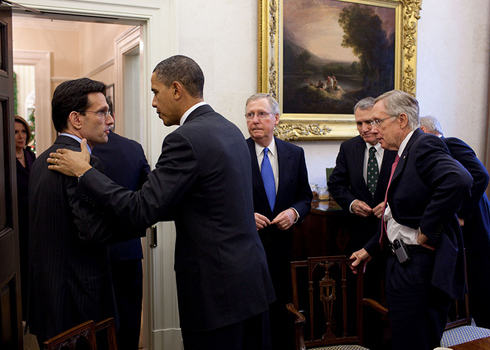Set aside for a moment the single biggest impasse in the debt fight — Republican opposition to any new tax revenues. There’s another impediment to raising the country’s borrowing limit, and it could easily turn into the sticking point that drags us to the edge of default or beyond.
For weeks, Republican leaders have insisted that they’ll only agree to raise the debt ceiling by an amount equal to or less than the amount of money they’re able to cut from the deficit over 10 years. But if revenues are off the table, that means the debt limit hike will be about as large as the amount of money Republicans and Democrats agree to cut from the budget in the decade ahead. And that is about to run headlong into President Obama’s push to raise the debt limit past the 2012 elections — and his threat to veto short term measures.
“I will not sign a 30-day or a 60-day or a 90-day extension,” Obama said at his Monday press conference at the White House. “That is just not an acceptable approach. And if we think it’s going to be hard — if we think it’s hard now, imagine how these guys are going to be thinking six months from now in the middle of election season where they’re all up. It’s not going to get easier. It’s going to get harder.”
If Obama’s bluffing — if he would indeed sign a temporary measure — that means we can expect to see a new version of this fight play out later this year or early next. Some Republicans would no doubt enjoy a second bite at the apple, but the political and economic risks of such a strategy would be enormous. As in the Bill Murray film Groundhog Day, the basic structure of what we’re seeing now could repeat over and over, but become bleaker and bleaker as time wears on.
If Obama is not bluffing, though, and if revenues are truly off the table, then negotiators will have to find enough cuts, at least on paper, to get there on the spending side of the ledger alone, and in a bipartisan fashion.
Republicans would like you to believe this is possible. According to House Majority Leader Eric Cantor (R-VA), he and a bipartisan working group led by Vice President Joe Biden basically got there already. “[W]hen you are talking about the non health care mandatory area, we have roughly in the neighborhood of $300 billion; in the health care mandatory area we have roughly in the neighborhood of $350 billion; in the discretionary area we are in the $1.1 trillion and we hope to be in the $1.3 trillion area. When you’re talking interest, you are roughly in the $330 to $350 [billion] range,” he told reporters at a Monday Capitol briefing.
But Democrats dispute this strongly. They say the group identified — but did not agree to — significantly smaller cuts, and that even those cuts were contingent on the group agreeing to a revenue component. Of course, when they decided it was time to talk taxes, the talks broke down.
Republican leaders may be unwilling to push new tax revenues on their doctrinaire rank and file members. But they might regret having scotched a grand bargain that would have taken the debt limit off the table for the foreseeable future if they have to play footsy with default again in the middle of election season.










